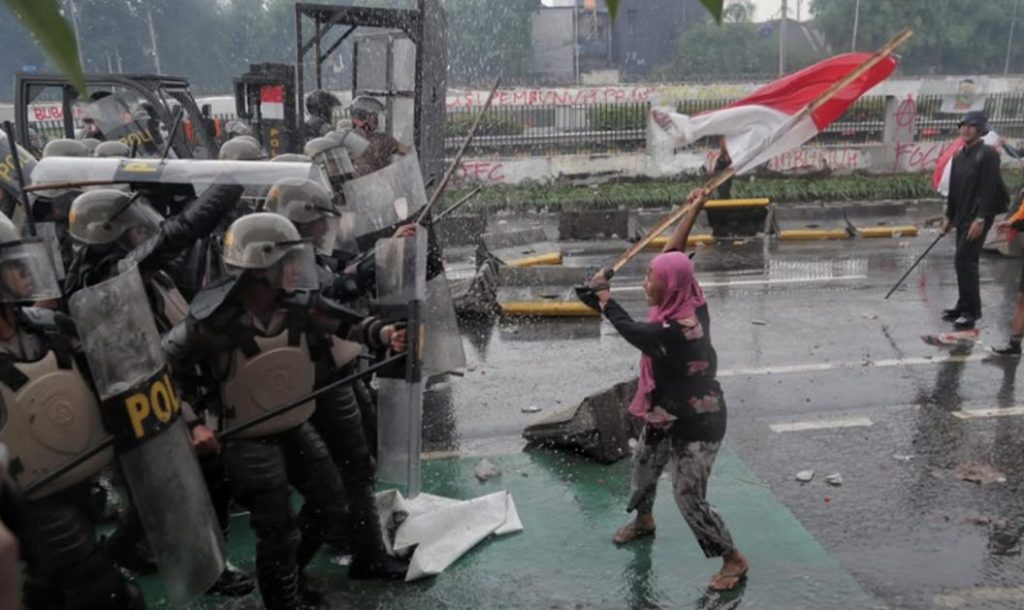
Written by Alita Khansa Wirahman
It started, with food, as it so often does in Indonesia,
A girl orders food from a rideshare app. She waits for the delivery man to arrive. He never does.
At the same moment, Jakarta’s streets are thick with anger. Thousands march, banners raised high, voices hoarse from chanting. Their fury is well-earned. Indonesia’s parliament has just approved a scandalous housing allowance: IDR 50 million—about AUD 4,650—every month for each member of parliament. Meanwhile, Jakarta’s minimum wage stands at AUD 500 monthly, and even that is a fantasy for most, who scrape together a living through informal work, due to the scarcity of formal employment.
The anger is not only for this injustice. It is for the abuse under President Prabowo Subianto’s rule:
- Billions spent on jets and submarines while children go hungry.
- Food prices spiking from bungled import policies, crushing families already on the edge.
- Journalists silenced, critics jailed, the democratic space shrinking.
- Hospitals and schools ignored while the elite feast.
- And a cruel new tax increase—200% in 2025—hammering the poor.
The streets are a living organism: vendors selling skewers under clouds of tear gas, police in black armour with riot shields, protesters waving handwritten signs, and ojol (rideshare app) riders weaving between them all, trying to do their jobs.

Demonstrations heated up around the DPR/MPR (Parliament Complex) area in the afternoon on Thursday, 28 August. (Source: CNN Indonesia)
One of those riders was Affan Kurniawan, 21 years old. He wasn’t there to protest. He wasn’t there to chant or hold a banner. He was trying to deliver a customer’s meal. He was run over and killed by a Brimob (Police Tactical Unit) armoured vehicle—funded by the very taxes he paid.
Affan was a son, a brother to four siblings, and his family’s breadwinner. He was killed on the streets. His name would have been forgotten, erased from the records, had a protester not been recording in the right place at the right time. The footage spread like fire on social media before any television station dared to even whisper his name.
There’s a reason for that. 66 of the country’s largest TV and radio outlets were banned by the government from reporting on the current political state in Indonesia. TikTok Live has now been disabled in Indonesia, a calculated move: no livestreams, no proof, no accountability. In this new order, silence is a policy, not an accident.
In my country, millions are mourning a boy who was simply trying to work. Thousands march for dignity, for justice, for a future worth living in. And yet, there is no safe way to speak. No safe way to grieve. Who do you call when the police kill? Where do you run when those meant to protect you are the ones who crush you beneath a tank? What do you tell the world when your own press refuses to tell the truth?
Indonesia loves food. It is our love language. “Udah makan belum?”—Have you eaten? It’s what we say to strangers and loved ones alike. Yet beneath this kindness lies a quieter truth: hunger is our constant companion. It rumbles not just in our bellies but in the streets, in the cries of vendors selling satay as tear gas wafts through alleyways, in the roars of protesters who are tired of being stolen from.
It started with desperation, with injustice so blatant that even the most timid are forced to see it.
And the government knows it. That’s why they gag the press, ban livestreams, and weaponise silence. They want obedience, not justice; fear, not hope.
So allow me to retract my first statement for correction, it started with hunger, as it so often does in Indonesia.
But hunger grows. It always has. And it won’t silence until people are fed.
Views: 52
